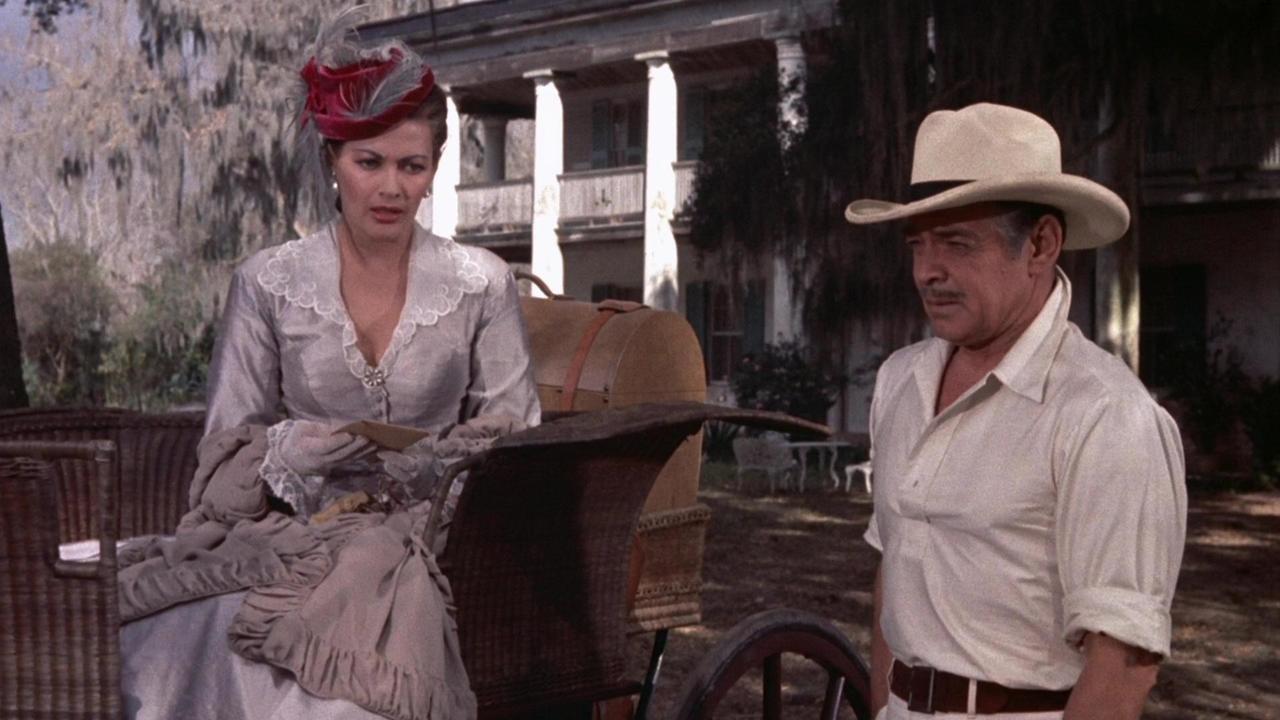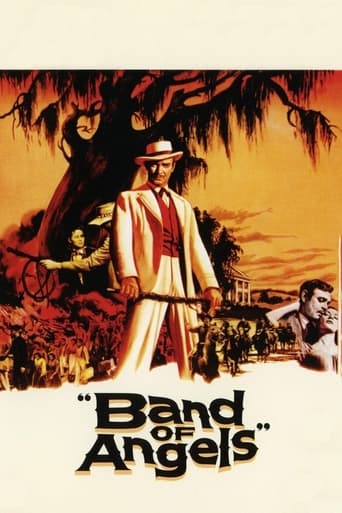

Amantha Starr (Yvonne De Carlo) is the cultured daughter of a Kentucky slave owner. Abolitionist Seth is taken with her. Upon her father's death, she returns home to find Miss Idell had claimed the estate and Amantha was ruled to be born from a slave mother. The blue-eyed white girl is taken by the slave trader to pay off her father's debt. Hamish Bond (Clark Gable) takes pity on her and bids the vast sum of $5k to purchase her. He may be kind to his slaves but he is still a slave owner. Rau-Ru (Sidney Poitier) and Michele are two of his slaves. The Civil War begins.It's an odd concept to put a white woman into slavery of the old South. Based on a novel by Robert Penn Warren, maybe there is good intention in the material but it does not execute well. Hamish tries to be heroic but I can't accept it. At least, Beauty and the Beast has the Beast grow into loving Beauty. Clark Gable is playing Clark Gable. Hamish isn't the character who grows but it's up to Amantha to grow from her freed high-class privilege to submit to her romanticism. Her reversals are neck breaking. Why she would spend time with Charles is beyond me. It's also a little shocking to see Poitier play this role although he does give it depth. There are some bad classic slave characters. This has some really clunky turns and the pulpy romance does not help. I'm not saying that this somehow supports slavery but it does have an idyllic version in addition to the more evil realistic one. There are lots to question but I'm uncertain about the intention.
... View MoreSold into slavery when it is revealed that she has African American blood, an orphaned young woman has to wrestle with her racial identity as well as the unclear intentions of an owner who treats her as a guest rather than a slave in this Raoul Walsh drama set during the American Civil War. There are some great subplots, particularly Sidney Poitier as a bitter slave who decides to assert himself, however, the central story is too melodramatic to click with personal identity issues pushed into the backdrop to focus on the tension between Yvonne De Carlo and Clark Gable as the protagonists. Conflict comes from De Carlo believing that Gable only wants her body since he does not treat her like a slave, and Gable having to convince her that he is just benevolent to all slaves. There are a couple of other (younger) supporting characters with romantic designs on De Carlo too, and yet there is a limit to how involving it is to watch De Carlo contend with suitor after suitor. Max Steiner's garishly overbearing music score also only serves to highlight just how soap opera-like the film is, which is a shame because a lot could have been made from a film about a woman grasping with her ethnic routes. Shot on location in Louisana, the film certainly looks nice enough, but it is easy to see why Gable was disenchanted with the overall product, refusing to work with Walsh again afterwards.
... View MoreIn Kentucky in the antebellum of the Civil War, Amantha Starr (Yvonne De Carlo) is the pride and joy of her father, the plantation owner Aaron Starr (William Forrest) that treats her slaves with dignity. When he dies, Amantha learns that he mother was black and she is included as a slave to be sold to pay his father's debts. She is sent to an auction in New Orleans and bought by the wealthy Hamish Bond (Clark Gable) by a fortune. He brings her home and treats her as if she were a guest. Amantha meets the slaves Rau-Ru (Sidney Poitier), who is treated like a son, and Michele (Carolle Drake), who is Hamish's mistress and in love with him. Soon they fall in love with each other, but Hamish discloses a dreadful secret from his past, their relationship ends. Meanwhile the Civil War breaks out and Hamish becomes a wanted man while Rau-Ru joins the Union Army. Will the love of Amantha and Hamish be doomed by the war? "Band of Angels" is a romantic epic that seems to be a soap opera with a story with many twists. The plot seems to be a melodramatic version of "Gone with the Wind" and Rau-Ru first attitude is ungrateful. The best moment of this melodrama is when Amantha discovers that she is considered a black woman and consequently a slave. Her situation is impressive and heartbreaking. The spoiled woman is suddenly transformed into a property of despicable men. My vote is seven.Title (Brazil): "Meu Pecado Foi Nascer" ("My Sin Was to be Born")
... View More19 years after "Gone with the Wind" Clark Gable returns as a very-much-like Rhett Butler role of Hamish Bond; no doubt for the pleasure of us moviegoers it's one of his best roles.A very rich ex-slaver takes an interest in a white girl suddenly being sold as a slave based upon the revelation that her mother was black. The story covers about six years and it is beautifully filmed; a picture worth seeing every few years.The Yankees do not look good in this movie; because the film was well researched and scores about 90% for historical accuracy. Union General Butler was much worse and more corrupt as portrayed here. It is also worth noting that MOST slave traders were in fact from New England, Massachusetts being the first slave state where slavery was used widely to do the Yankee's dirty work. America's #1 slave trader -- not a nice man like Clark Gable's portrayal, but one of the most rotten men in American history -- was Brown of Rhode Island, the founder of Brown University, built with slave-trade money. Mass-Conn-RI were loaded with slaves, about 40% of their population; very quiet about it these days.Today's empty-headed Hollywood is very confused about slavery. Devoted to "political correctness" but clueless to its meaning, most classic movies containing so much as one slave (or no slaves, as in Walt Disney's "Song of the South") are quietly not available except thru bootlegs. "Band of Angels" somehow escaped the PC Squad; readily available on DVD. 9 out of 10.
... View More